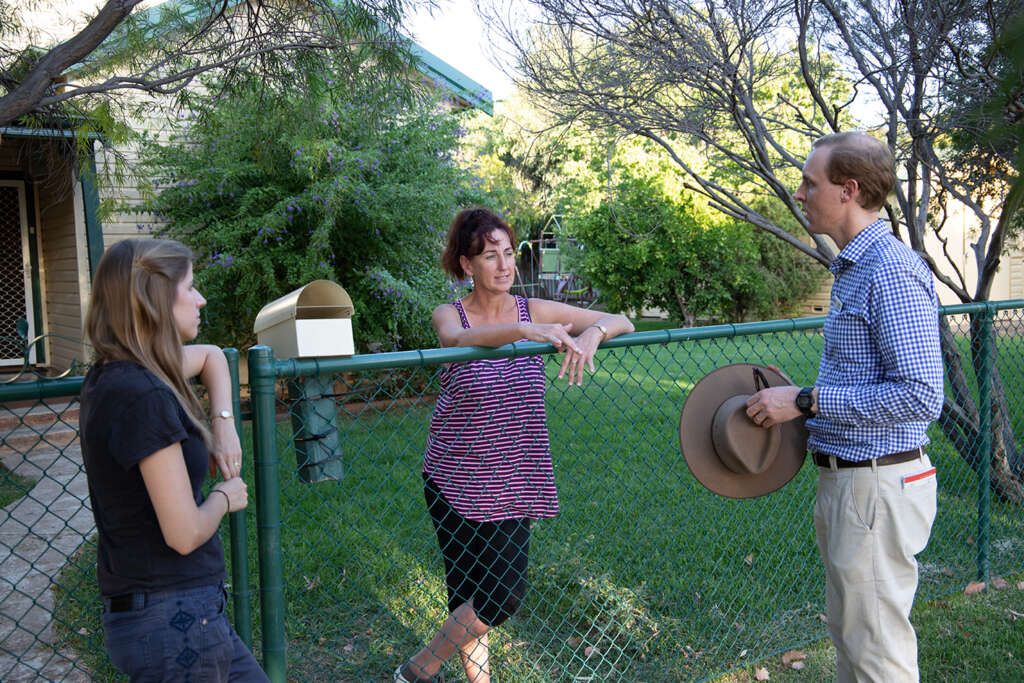With Advent starting on Sunday, it’s a good time to be thinking about how to invite people to church at Christmas. As you have conversations with people through December, how do you bring up the subject and what’s the best way to overcome obstacles?
You may also be thinking about how to talk about Jesus with your non-Christian friends and family over Christmas lunch and dinner.
I turned for some tips to my friendly local evangelist James Daymond, who spends a great deal of time having conversations about Jesus with people in his role as an evangelist-deacon with the Bush Church Aid Society. Over the past six years in the Central West of NSW, first in Narromine, now Mudgee and soon in Cobar, he has encouraged church members in chatting about Jesus over the farmgate and around town.
“It’s quite exciting for church members to have something in their hand that they’re proud about.” – James Daymond
For James, the whole issue of how to invite someone to church at Christmas is like putting the cart before the horse, and you need to go back a step.
“Asking someone to go to church is like asking them, ‘Would you like to come down to the police station with me? Or the courthouse?’ These are places that you avoid because you feel like you have to be on your best behaviour. When did you last pop down to the police station for fun? It’s not exactly the hottest invitation for people,” he says.
“The big thing I would say is to try and talk about Jesus before you extend an invitation. We have to be first of all sensitive to seeing something of God work in a person’s life, looking for a softness of heart, then starting to talk to them about Jesus.”
Generally, there are two approaches to Christmas service invitations: one is the broadcast of letterbox flyers in an area and the other is a personal approach.
“Most parishioners I know are very happy to put an invitation in someone’s hand or letterbox. But what we want to try and do is talk to them about Jesus, not just give them a flyer,” says James.
That said, he believes it’s important to encourage your minister to produce an attractive flyer. “God can do things without fancy flyers and we don’t want to be glitzy and showy, but I do think it’s quite exciting for church members to have something in their hand that they’re proud about when they extend an invitation. They’re being invited to something that’s really nice. So I really do think that we can at least encourage our ministers in that regard.”
Prayer can help ‘flyer success’, says James. “Even though it’s a low likelihood, I do think that you could pray and letterbox drop your street at least, or your road if you live in the countryside.
“We can get all a bit too smart in these areas saying this works and that doesn’t work. But there are so many stories over the years of the most unlikely people responding to a basic invitation in a letterbox. It doesn’t mean you have to letterbox-drop huge swaths of territory. But if you just did your street and then when you go for your walk, pray a little bit more consciously for each of them, I think that would be a very good thing to do.”
“More people are prepared to speak about Jesus than you think.” – James Daymond
When it does come time to personally invite someone to a Christmas service, you could simply ask, “Do you ever go to church at Christmas?” You could then follow up with, “Would you like to join us or would you like to join me this Christmas?”
“They can always find reasonable excuses, like I’ve got family, so it’s not too much of an awkward situation,” comments James.
If they are a little shy about saying “No,” you can take the pressure off by saying, “Yeah, I find that so few people go to church. I’m sort of a fish out of water.”
“I often would then ask them, ‘Have you been to church before?’ and hear what their story is. And then, if you haven’t talked about Jesus yet, you can ask deeper questions, like, ‘Have you ever heard much about Jesus in your life?’” says James.
“And what always amazes me is that more people are prepared to speak about Jesus than you think.”

James and Brittany Daymond chat over a fence in Mudgee.
If your invitees come along to a service, James gives the following advice: “If people do turn up at church, I try and make sure that I am always within about a metre or two of the person I am looking after. I watch how they’re engaging with people and then try to introduce them to who I think might be helpful or encouraging for them to speak with.”
After the service, don’t ask them if it was good or bad or did they like the minister or seek any assessment of the service.
“You don’t want these sorts of answers coming back to you because the church might have had a bad day, or the church might not have been as buzzing as it might normally be. What we want to do instead is deal with the content. And so I would be trying to ask a question about the talk or something in the service. I might say, ‘I noticed this, and that really intrigued me and it made me think of this or that. And I wonder, did you notice that?’”
The main point is just to be natural, he says; otherwise, you might appear stilted and choreographed – a mistake he has made in the past.
Another opportunity to talk about Jesus is around Christmas dinner table. James gives the following tips:
How to seize an opportunity at the dinner table on Christmas Day
1. Pray for an opportunity to speak about Jesus.
2. Prepare two questions so that you’ve got something to get the conversation started. You can draw those questions from what you heard at church that morning. Or it might be an interesting fact you’ve heard that can spark a dialogue. “I try and find two things, so if one was a complete flop at the entree, you might have another go at dessert.”
3. “Try not to be corny; you need to be very natural.” Don’t use tracts or a complicated conversation plan. “And pray that God will give you some prompts along the way. And if he doesn’t, then maybe that’s just not meant to be the day where anything is said. And we have to trust that that’s okay too.”
4. “Treat the conversation like playing tennis. When you play tennis, you hit the ball across the net and hopefully someone hits it back, and a rally follows. When you are talking about Jesus and make a statement or ask a question, that is like hitting the ball across the net. If there is no interest, leave it be. Don’t make another statement or ask another question. However, if there is a positive response, make another statement or ask another question and so on – this is like the tennis rally. If we take this approach, we avoid being a ‘Bible basher’ and can engage with the people who wish to be engaged.”
5. Use what you’ve got. You might not be the archbishop or the bishop, but they face the same challenges as you. “We’re all in the same boat and we’ve got to use what knowledge we have. Just drawing on what we heard at church that morning may be all we need.”
Email This Story
Why not send this to a friend?


